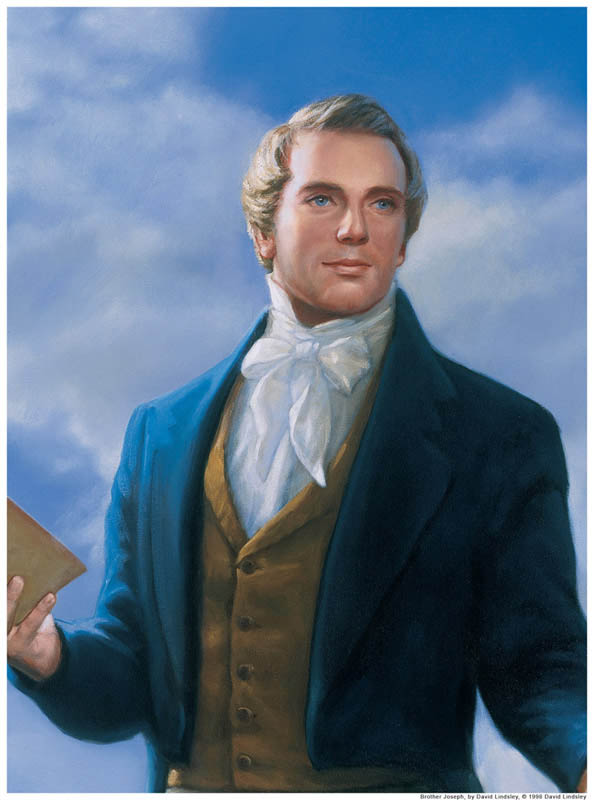Enoch is one of the most fascinating people in the Old Testament, and there is a mythology which has understandably grown up around him. There is little about him in the Bible. Mormons, members of The Church of Jesus Christ of Latter-day Saints (often mistakenly called the Mormon Church), have more about Enoch, found in the Book of Moses in the Pearl of Great Price. The Book of Moses was received by revelation to Joseph Smith as he was working on a new translation of the Book of Genesis. It gives great insight into how Moses was taught by God Himself that Jesus, God’s Only Begotten Son, would save mankind. Included in the Book of Moses is the story of how Enoch was called by God to be a prophet, how he felt inadequate, how God showed him all the people of the earth, and how the heavens wept over the fallen of God’s children. Enoch became a prophet to a wicked people, and eventually, all the people of the City of Enoch became so righteous, that they were “translated” and taken up to heaven, to return during the millennial rule of Jesus Christ.
 Joseph Smith had only 3 years of primary school education. His wife Emma explained how difficult it was for Joseph to compose a sentence in English, when he began translating the Book of Mormon, just barely out of his teens. Although the Book of Mormon had been written in “reformed Egyptian,” Joseph set about learning basic Hebrew from a Jewish tutor after he finished the work. Joseph lived in a rural area and had no access to scholarly books from which he could have drawn material for the writings he created. His information regarding Enoch, amazingly (or not, once you accept that he was a prophet) coincides with ancient apocryphal writings about Enoch.
Joseph Smith had only 3 years of primary school education. His wife Emma explained how difficult it was for Joseph to compose a sentence in English, when he began translating the Book of Mormon, just barely out of his teens. Although the Book of Mormon had been written in “reformed Egyptian,” Joseph set about learning basic Hebrew from a Jewish tutor after he finished the work. Joseph lived in a rural area and had no access to scholarly books from which he could have drawn material for the writings he created. His information regarding Enoch, amazingly (or not, once you accept that he was a prophet) coincides with ancient apocryphal writings about Enoch.
Scholars “Terryl and Fiona Givens consider the LDS account of Enoch as perhaps the ‘most remarkable religious document published in the nineteenth century.” Joseph Smith produced it early in the history of the Church of Jesus Christ, the same year as the Book of Mormon was published. There is absolutely no source for this record except revelation. The eminent Yale professor and Jewish literary scholar Harold Bloom found it remarkable that Joseph could produce something that contained so many “crucial elements in the archaic Jewish religion….that had ceased to be available either to normative Judaism or to Christianity.” He found it unlikely that Joseph Smith could have been exposed to these things even in the watered-down form in which some of it survived.
“The LDS accounts of Enoch combine both ancient elements and the results of subsequent prophetic shaping to enhance intelligibility and relevance for our day.” Thus, Jesus Christ as we know Him appears in the Enoch narration. Kathleen Flake explains Joseph’s method thus: “Joseph Smith did not see himself as ‘God’s stenographer. Rather, he was an interpreting reader, and God the confirming authority.’”
It appears that in this case and many other cases, Joseph Smith received more through revelation than he was able to impart through his writings, partly because the writing needed future reworkings, and partly because he was forbidden to reveal certain things to the public. God imparts knowledge line upon line, and we are simply not ready to receive new information until we have built up to it. In the beginning, letters of Joseph Smith seem to indicate that he didn’t expect his Bible translation to be published.
Joseph’s account of Enoch receiving his commission to be a prophet relates to the scene of Jesus’ baptism, when the spirit descended. His call is similar to that of Jeremiah and Moses in that he feels unworthy and incapable. Enoch claims to be slow of speech, but God promises to supply him with words. This report is very close to what is written in 2 Enoch 39:5 in the Book of Enoch. We read in the Book of Moses that through the power given him of God, Enoch was able to move mountains and rivers. The ancient Manaean account says the following: “The [Supreme] Life replied, Arise, take thy way to the source of the waters, turn it from its course. . . At this command Tavril [the angel speaking to Enoch] indeed turned the pure water from its course.”
Next in the Book of Moses, God makes it so Enoch is able to see with spiritual eyes, and he sees all the spirits of mankind. In 1 Enoch it says, “God touched [Enoch’s] eyes and he saw heaven.”
